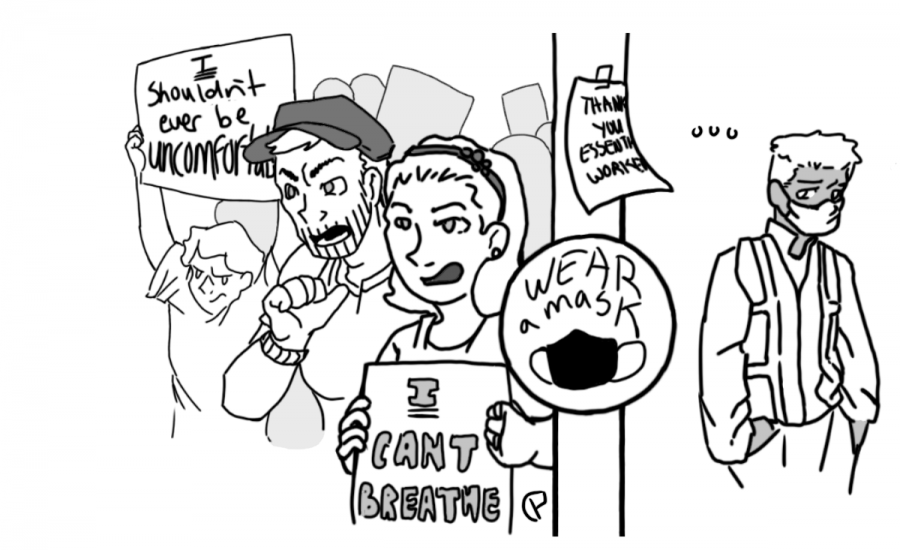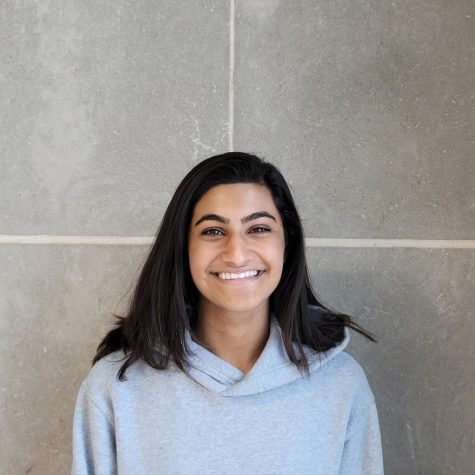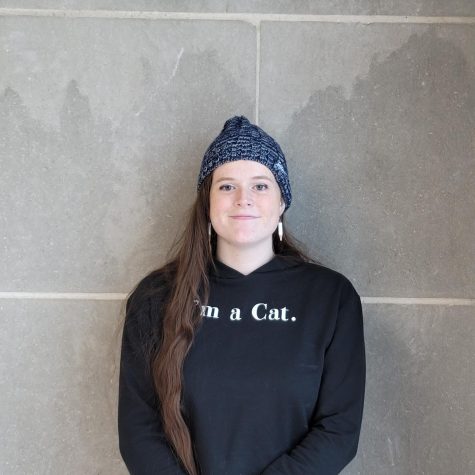The inherent privilege of using “I can’t breathe” in protest of masks
October 2, 2020
In 2014, Eric Garner yelled the words “I can’t breathe” before he was killed by the NYPD. This past summer, the same words were said by George Floyd before he too was killed by police in Minnesota. Since then, the phrase has become a rallying cry for the Black community, representing the oppression and discrimination they continue to face and the need for drastic change. And yet, white anti-maskers have claimed it as their own.
In the age of a major pandemic, the thought of refusing to wear masks, one of the only things proven to protect people from COVID, is already absurd to me. But chanting “I can’t breathe” at anti-mask protests, likening the discomfort of wearing a mask to the oppression of Black Americans? It’s privileged, it’s tasteless and it’s intolerable.
Black people struggle to breathe every day.
The issue begins with a lack of access to quality education amongst Black communities. According to a 2011 study by the United Negro College Fund, only 57% of Black students have access to a full range of math and science courses needed to be prepared for college, in comparison to to 71% of white students. This puts Black students at a disadvantage from a young age, limiting their career options for the future. In 2019 the U.S. Bureau of Labor found that because of the lack of resources, the Black community is largely over-represented in “essential workforces.” Thus, during this pandemic, many black employees do not have the luxury of working remotely and are at an increased risk of exposure to COVID.
Additionally, environmental racism, which refers to disproportionate environmental hazards in communities of color, furthers chances of exposure to COVID. In a 2018 study, the Environmental Protection Agency found that on average, black people are exposed to about 1.5 times more particulate matter than white people. The study linked such exposure to frequent development of underlying health conditions including asthma, known to increase the risk and severity of COVID cases.
If a Black person is to contract the virus, implicit bias and racial disparities in the healthcare system pose major barriers to recovery. In 2005, the National Academy of Medicine found that “racial and ethnic minorities receive lower-quality health care than white people—even when insurance status, income, age, and severity of conditions are comparable.”
Data supports the disproportionate harm that COVID has had on Black people. According to a study conducted in April of this year by the Associated Press, at the time Black people comprised 42% of the nation’s COVID deaths, while only accounting for 21% of the total population across six major U.S. cities.
And now, white anti-maskers are using a phrase meant to support Black lives to instead justify spreading a virus that just so happens to disproportionately harm Black lives.
Black people can’t breathe when a broken system weighs down on them, limiting them in their opportunities for the future. Black people can’t breathe when they are forced to work in hazardous conditions. Black people can’t breathe when they are exposed to excessive pollution in their communities. Black people can’t breathe when they recieve inferior treatment from healthcare workers. Black people can’t breathe when America fails them again and again.
White people, you CAN breathe, even while wearing a mask. Recognize your privilege and stop misappropriating this important cultural phrase.










Joe Flenderson • May 28, 2021 at 7:12 pm
@Shelly Swank
Rent free
Shelly Swank • May 21, 2021 at 9:40 am
Naperville… I should have guessed how this was going to go. I lived in Naperville years ago before finally getting out of that hole, and the sh** pit that’s known as Illinois, and moving to Texas. I also love how the bio for Amisha is worded to make her sound like an optimistic, powerful person yet Danielle is made to sound like a flimsy flake. Oh, right. Amisha is a person of color and Danielle is white. Nah, that’s not racist, is it?
john • Oct 13, 2020 at 5:50 pm
I love how you specified “white” before talking about anti-maskers, really helps solve the racism problem you love to speak about.